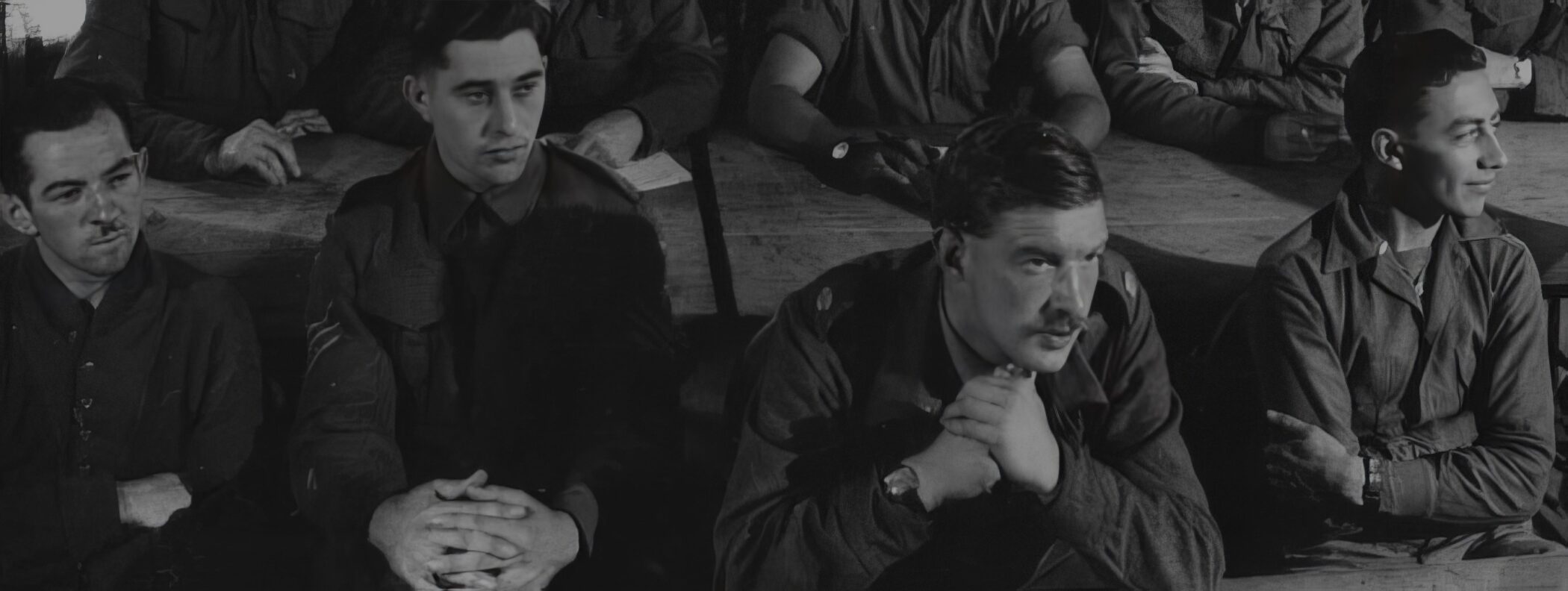Educate
Our educational activities relate to the general public wherever possible and we frequently lecture to local community groups for a fee that helps support our other activities. We are also, as part of our aim to INSPIRE, committed to educating the modern-day military and cadets.
One of the driving forces in our charity’s establishment was the knowledge that very few people were aware of the ‘secret war’ aspects of WW2 and that those who were aware tended to be the next generation down of those who had served during the war. As the veterans themselves dwindled in number, to be inevitably followed by the generation of their daughters and sons, our Co-Founders (Martyn Bell and Martyn Cox) were determined that we should reach beyond these generations. We therefore partner with museums where school children will see our presentations and directly young people via schools, colleges and universities.
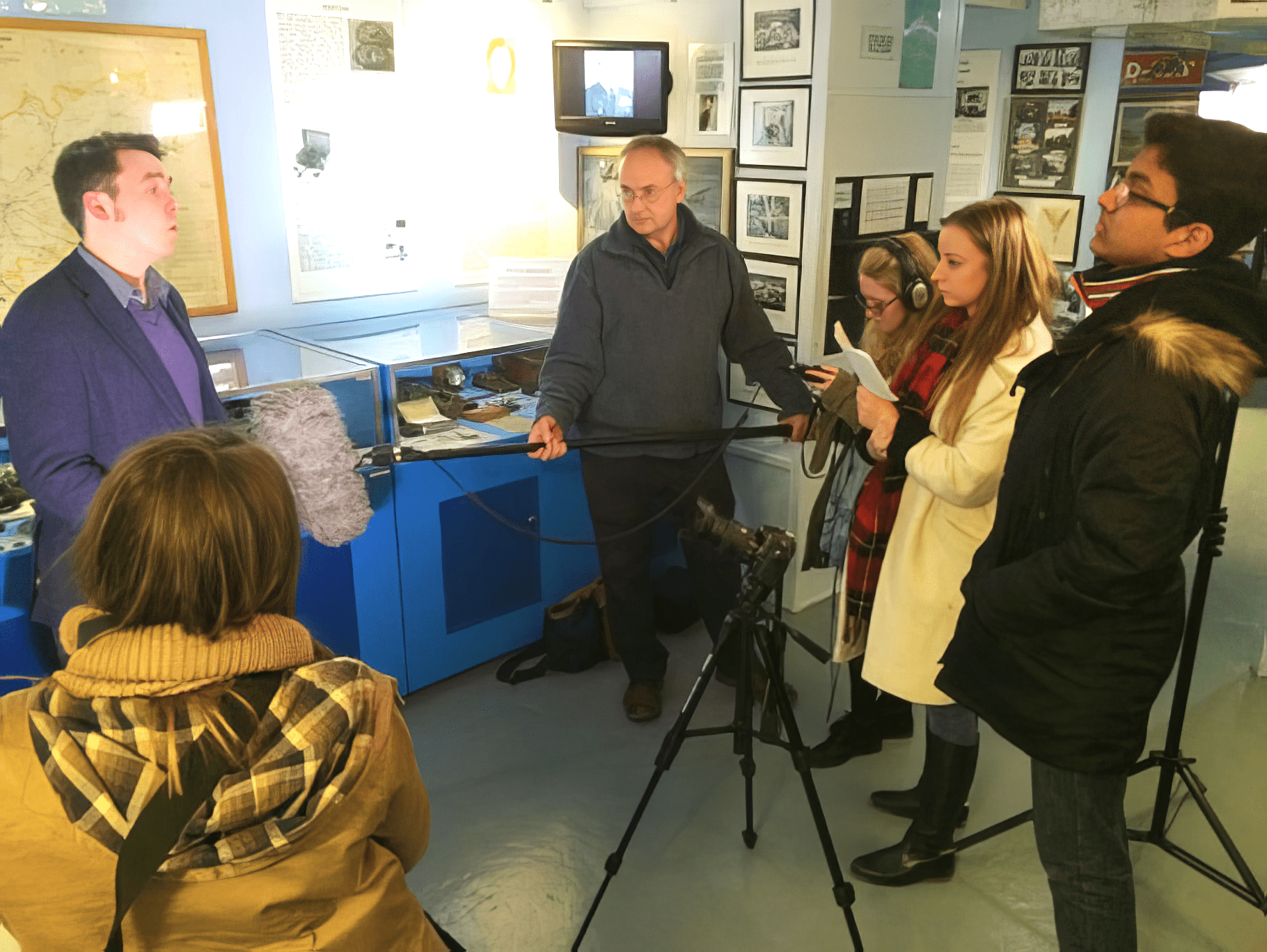
Students from University of Chichester in a Secret WW2 project visiting Tangmere Military Aviation Museum in Sussex.
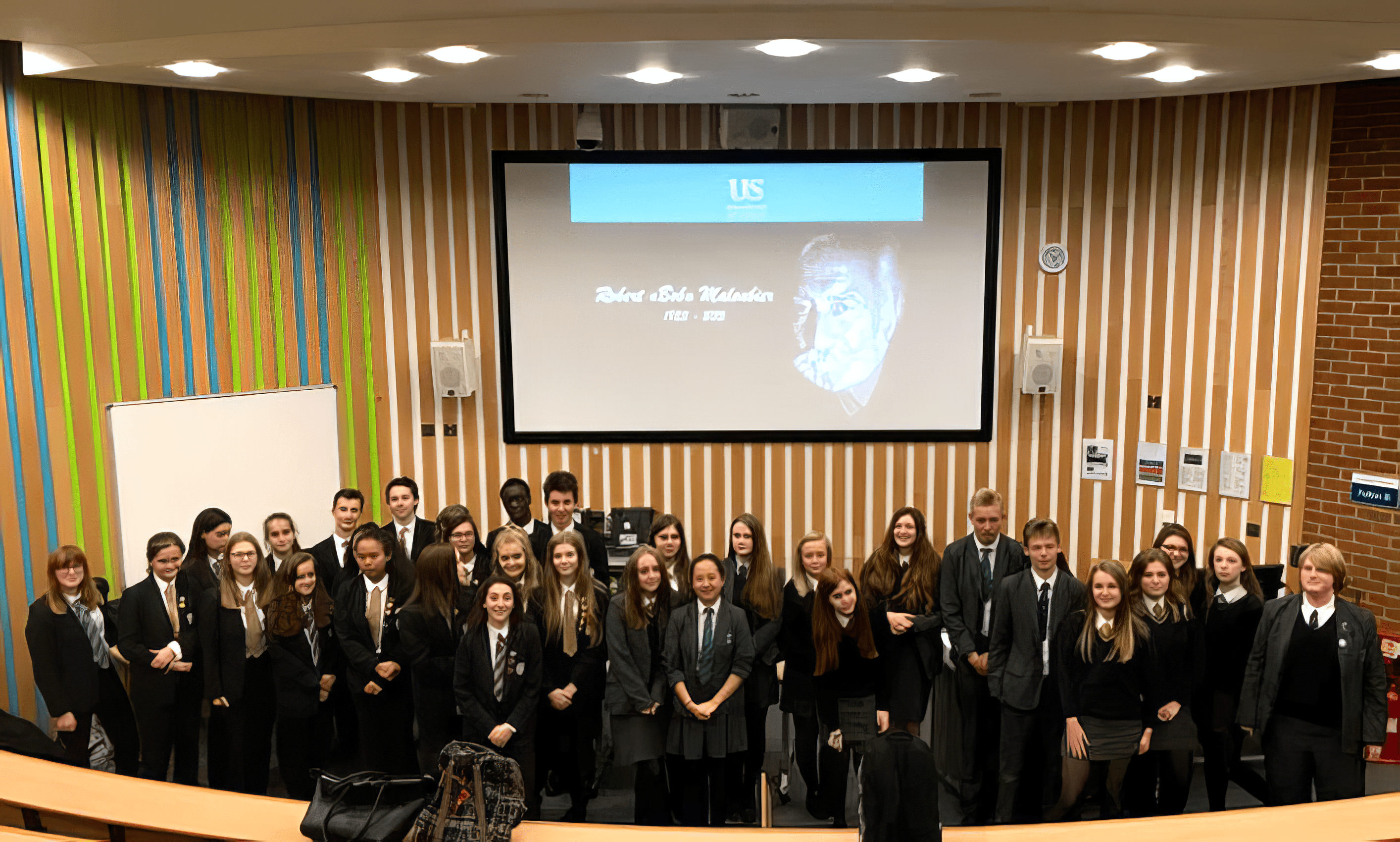
Students at Brighton College after a Secret WW2 presentation.
In more recent years we have introduced two ongoing projects: university-level bursaries and a scholarship in India, which are described in more detail below.
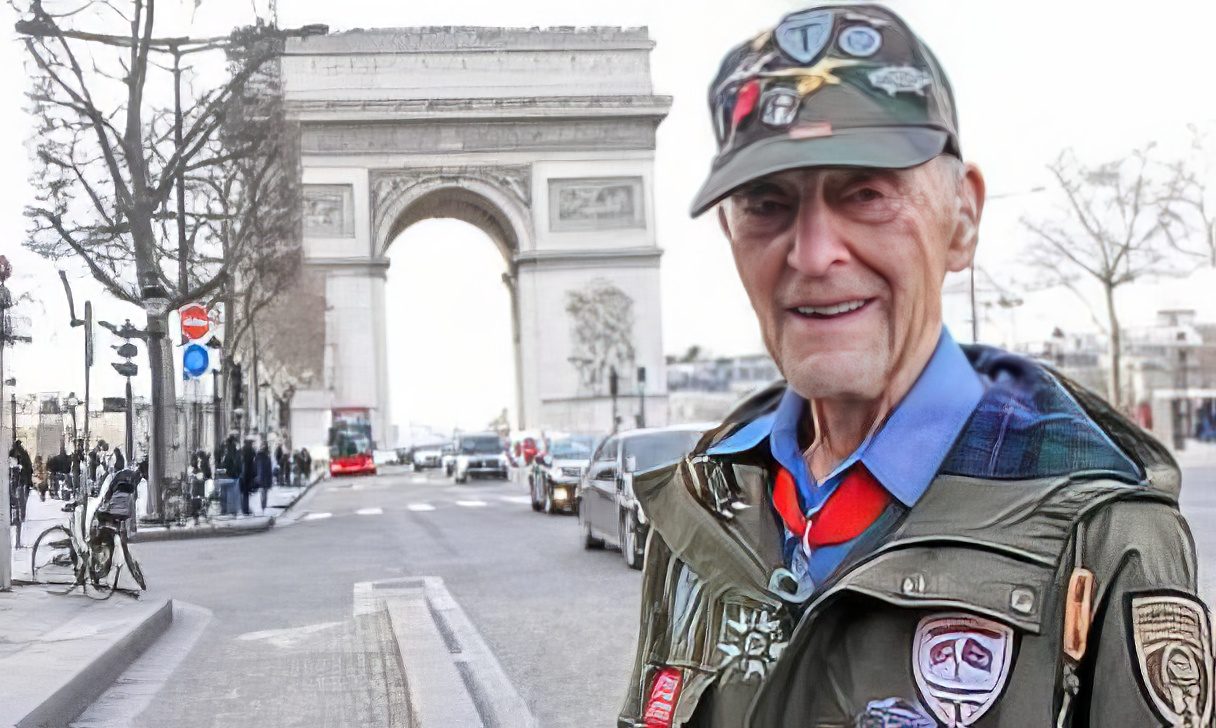
THE STEVE WEISS RESEARCH BURSARIES
THE STEVE WEISS STUDENT RESEARCH BURSARIES
offered by
SECRET WW2 – The Secret WW2 Learning Network
to students of
the University of Chichester and the University of Kent
The 2023 call for applications is now open, with a deadline submission date to the relevant university co-ordinator, by 1st November 2023.
To download the APPLICATION FORM, please click here
About the bursaries
The two Bursaries have been created and funded by The Secret WW2 Learning Network, (The SWW2LN) a British educational charity, in memory of Dr Stephen Weiss, a WW2 veteran and UK-based academic and writer who died in 2020, aged 94. Steve Weiss was a subscribed Friend and strong supporter of The SWW2LN, a wonderful character who was
well-known to many members of the charity. His obituary is given as the appendix to this document.
The purpose of the Bursaries is to enable each award winner to undertake a study, or complete part of a larger study, which would necessarily involve travelling to undertake research. Each Bursary will provide finance to a maximum of £500 for travelling, accommodation or other related expenses. Retrospective awards will not be considered.
Eligibility
The Bursaries are only open to students of a relevant study course (e.g. History, International Relations, Politics) at the University of Chichester or the University of Kent. One Bursary is available to each university. In the event that one Bursary does not attract a suitable application, it may be allocated as a second Bursary to the other university. Awards are open
to students registered on full-time traditional or distance learning programmes. Students working and studying part-time who are able to clearly demonstrate financial need are also eligible.
The Bursaries are intended for:
- undergraduate students (e.g. BA/BSc) who have to undertake a final year project involving original research in a secret/clandestine aspect of the Second World War;
- postgraduate taught students (e.g. MA) who have to undertake a dissertation involving original research in a secret/clandestine aspect of the Second World War;
- postgraduate research students (e.g. MA by Research, MPhil or PhD) who have to undertake a thesis involving original research in a secret/clandestine aspect of the Second World War.
How to apply
Applications for the Bursaries are accepted only following a call by The SWW2LN and before the deadline specified in the call. You should apply using the form provided here and to the contacts specified, you should not send requests or applications directly to The SWW2LN.
If you do not meet the eligibility criteria, please do not apply.
You are strongly advised to consult your academic supervisor before preparing an application. Candidates should inform their supervisor that they intend to submit an application and supervisors will be required to write a short statement of support confirming that applicants are registered students planning to undertake the described research.
Outline proposal
In preparing an application, you should describe the project or discrete piece of research in
the form of an outline proposal of not more than 750 words. Your proposal should provide
the following information:
- the research question(s) to be addressed;
- the research methods to be employed in the research;
- details of how the research methods will be implemented in order to make it clear how the expenditure will be incurred;
- a breakdown of your anticipated budgeted expenditure. This should be expenditure that is directly incurred in the execution of research, for example travel and subsistence costs for travelling to interviews.
The SWW2LN will NOT provide funding for the purchase of general purpose material or equipment, such as laptops, office software or reading material. Neither will The SWW2LN make a contribution to general living costs during the dissertation period. You should indicate the amount requested from the Bursary and also the possible availability of other sources of
funds.
A holder of this Bursary should submit expenses up to the amount awarded within 9 months.
Applications should be submitted to the following contacts who will then shortlist and submit
no more than three applications from each University to the panel of three Trustees of The
Secret WW2 Learning Network:
University of Chichester: Dr Andrew Smith – [email protected]
University of Kent: Professor Mark Connelly – [email protected]
Reviewing process
Every shortlisted application will be reviewed by a panel comprising three Trustees of The SWW2LN who will rank applications on the basis of: quality, value for money, and impact. The decision of the panel will be final.
Annual call for applications and programme of dates:
- submission deadline: 1 November
- award winners of the Bursaries will be informed by 1 December
Dissemination
In your application you should also consider the subsequent dissemination of information or understanding gained from the research supported by the Bursary and should discuss possible methods of dissemination. You are strongly encouraged to discuss possible avenues for dissemination with your supervisor. Dissemination plans should aim to reach at least two
relevant organisations/bodies, e.g. academic journals, institutional newsletters, respected blogs etc.
Report to the Trustees
The Bursary winners must acknowledge the award in their research output with the wording:
This research was conducted with the assistance of The Steve Weiss Student Research Bursary, created and funded by SECRET WW2 – The Secret WW2 Learning Network, a UK registered educational charity
and provide the Trustees with a copy of the research report or dissertation. The Bursary winners must also submit a shorter 1-2 page informative abstract setting out the aim and objectives of the research, the methods used, the key findings, conclusions and recommendations. The SWW2LN may publish the abstract on its website, Facebook page or in its newsletter.
Conditions
The decisions of the Trustees of The SWW2LN are final and they reserve the right not to make an award of a Bursary if they judge there to be no suitable candidates.
The Trustees of The SWW2LN will correspond only with winners of the Bursary and will not enter into any correspondence or other contact with applicants for the Bursary unless there is a need for clarification.
The Trustees will use information provided in applications to publicly announce the award of the Bursary, along with winners’ names and project titles: on The SWW2LN website; its Facebook page; and in the charity’s newsletter. Final reports of funded projects may also be added to The SWW2LN’s website.
Completed forms should be sent to the relevant university contact named above
Further Information
For further information about the Bursary please get in touch with the relevant university
contact, as detailed above.
Photo credits: top of page of Steve at the Arc de Triomphe in Paris, February 2020 by Chad Garland/Stars and Stripes; below at Valencay in 2021.
Stephen Weiss obituary
By Steve’s daughter, Claudia Pétursson and published in The Guardian, 27th February 2020.
My father, Stephen Weiss, who has died aged 94, was a member of “the greatest generation”, who fought in the second world war. He was on the frontlines in France in the summer of 1944. Caught in a firefight in the Ardèche region, he and seven others were separated from their unit and hunted by Nazi forces. A farmer, Gaston Reynaud, hid the Americans in his hayloft. With help from the French Resistance, they organised their escape. Dressed in police uniforms, they crossed enemy lines, beginning a harrowing journey to safety.
Steve was born in Brooklyn, New York, to Jeanette (nee Seidman), a seamstress, and William Weiss, a bodyguard. In 1942, immediately after graduating from Lafayette high school, Brooklyn, he volunteered for service in the US army.
At the end of the war, he worked for the Department of the Army as a photographer based in Paris. He travelled all over Europe recording the devastation of war, venturing as far north as Norway and as far south as Sicily. His photos are a part of the US National Archives. He returned to Brooklyn in 1946 and spent about six months in intense treatment for PTSD. He learned to manage it, and became involved in supporting affected veterans.
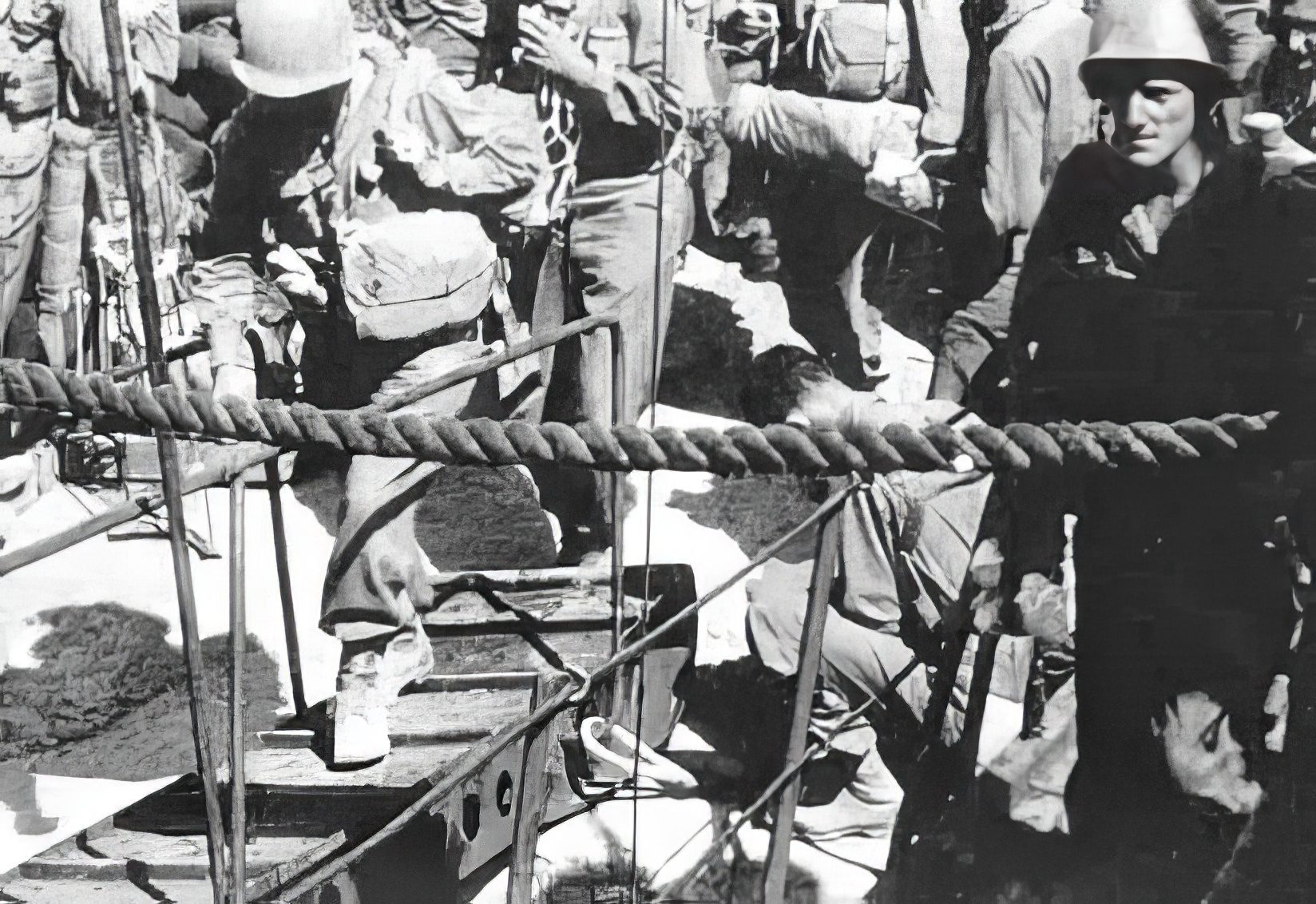
Steve Weiss, far right, boarding a troop ship in the USA, bound for France during the Second World War.
Around 1948, he travelled to Los Angeles, where he enrolled at radio and television school. He was hired by CBS, and worked in the entertainment industry for the next 30 years. In LA he met Rosemary Valaire, a former Royal Ballet dancer, who was teaching at the American Ballet School. They married in 1957, and had two daughters (my sister, Alison, and me) and a son (my brother, Andrew).
Steve worked in sound editing at CBS, ABC and various Hollywood editing firms until 1989, when he decided to take early retirement and pursue his interest in military history. He had already studied for a master’s in psychology at Goddard College, Vermont, in 1976. Because he wished to know more about the part of the war in which he had fought, he was advised to study in Europe and pursued doctoral studies at King’s College London. He received a master’s in war studies in 1990 and a doctorate in 1995.
Steve became an extremely popular lecturer at King’s from 1995 until 2020, and was made a KCL fellow in 2019. He authored two books, Allies in Conflict (1996) and The Invisible Scars of War (2011). My father was made a Chevalier de la Légion d’honneur in 1999, then Officier in 2007 and Commandeur in 2013. He also received the US Bronze Star, the French Médaille de la Résistance and two awards of the Croix de Guerre. In February 2020, he travelled from London to participate in the 75th anniversary commemoration of the US Office of Strategic Services in his beloved Paris, the city he fell in
love with as a young soldier, to lay a wreath on the grave of the unknown soldier under the Arc de Triomphe. Steve is survived by his children, Alison, Andrew and me, and by eight grandchildren and a great-grandson.
Claudia Pétursson
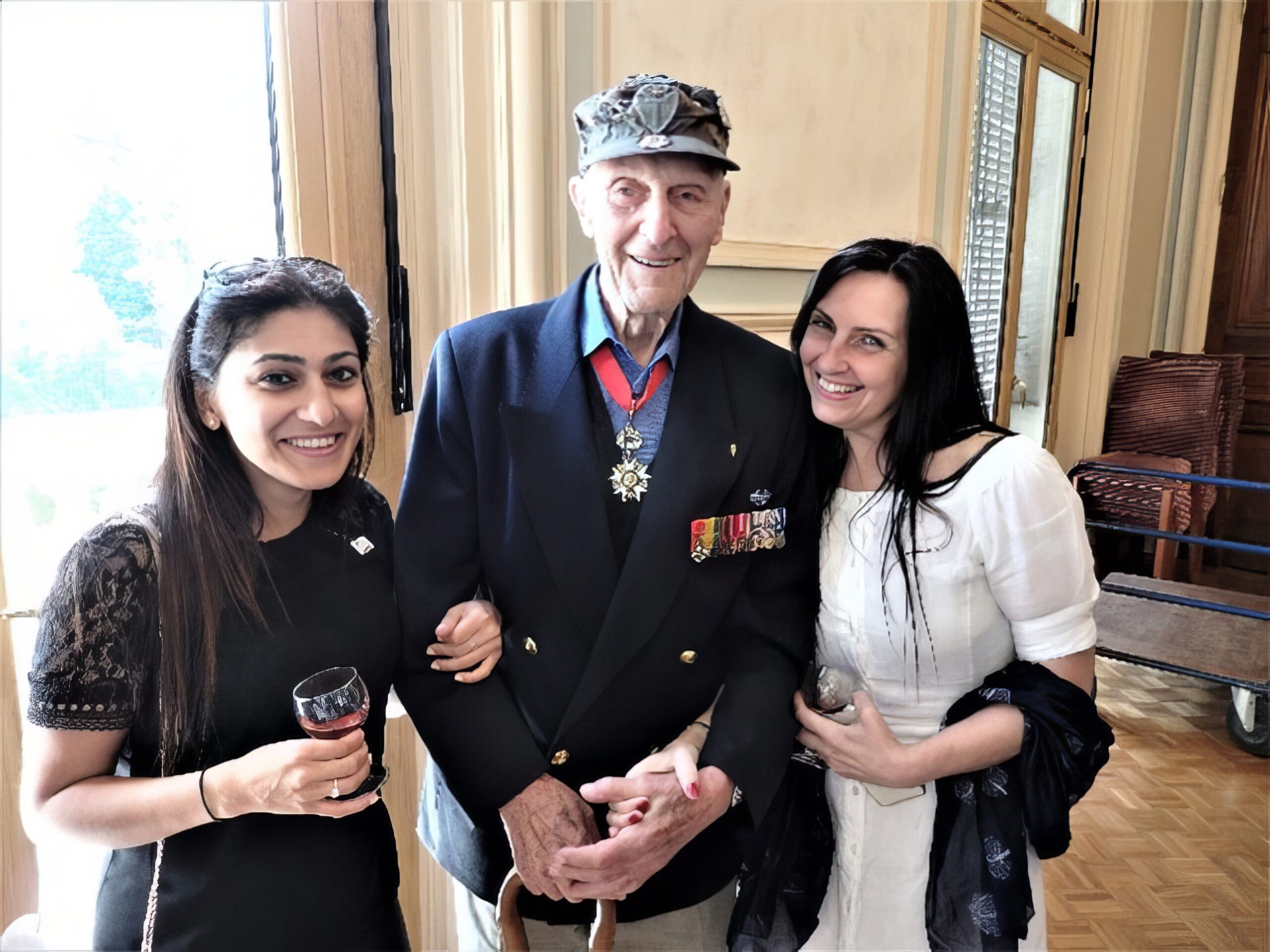
Steve with members of Secret WW2 at Valençay, France in 2019
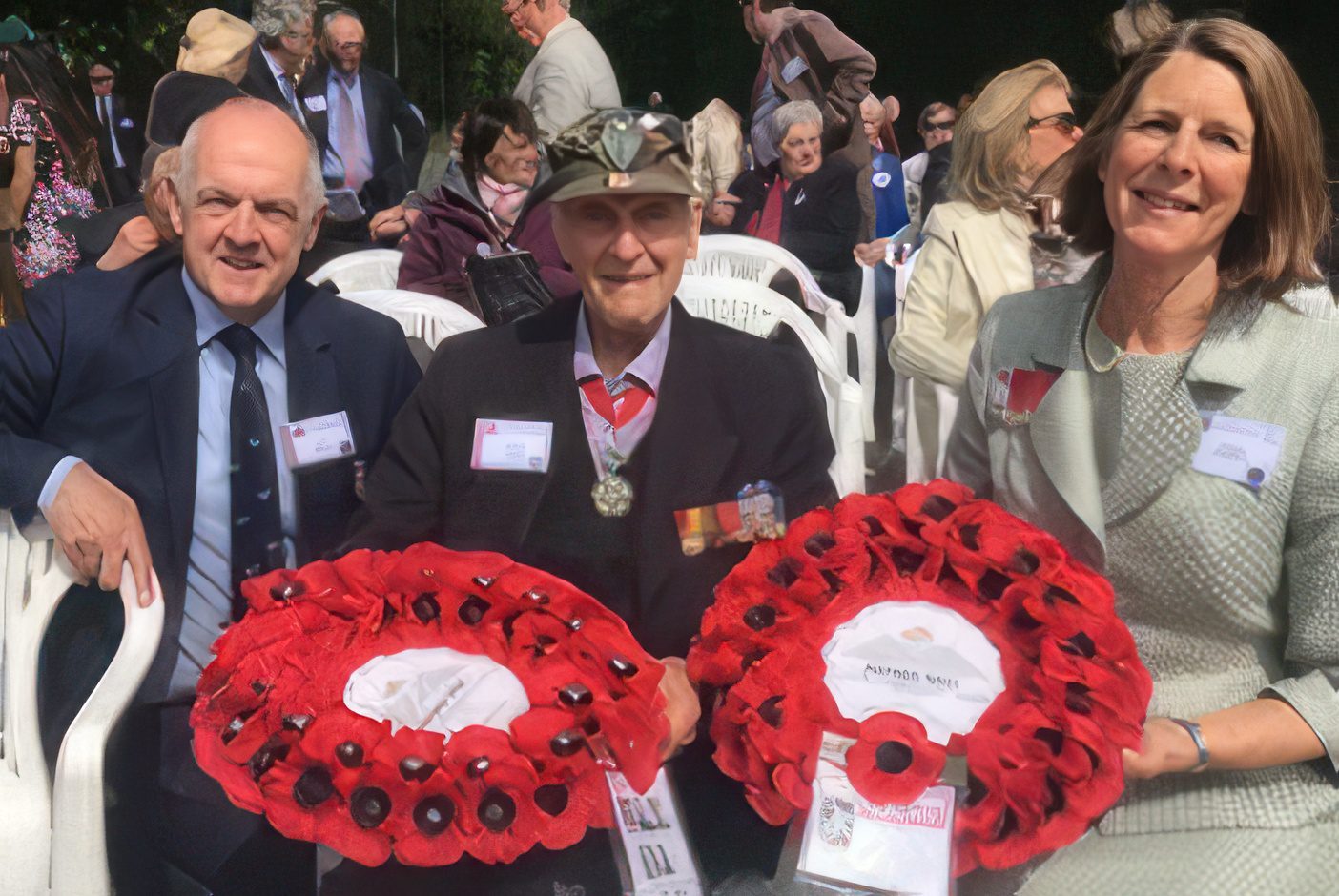
Steve with Secret WW2 Chair Louisa Russell and Executive Trustee Paul McCue at Valençay, France in 2019
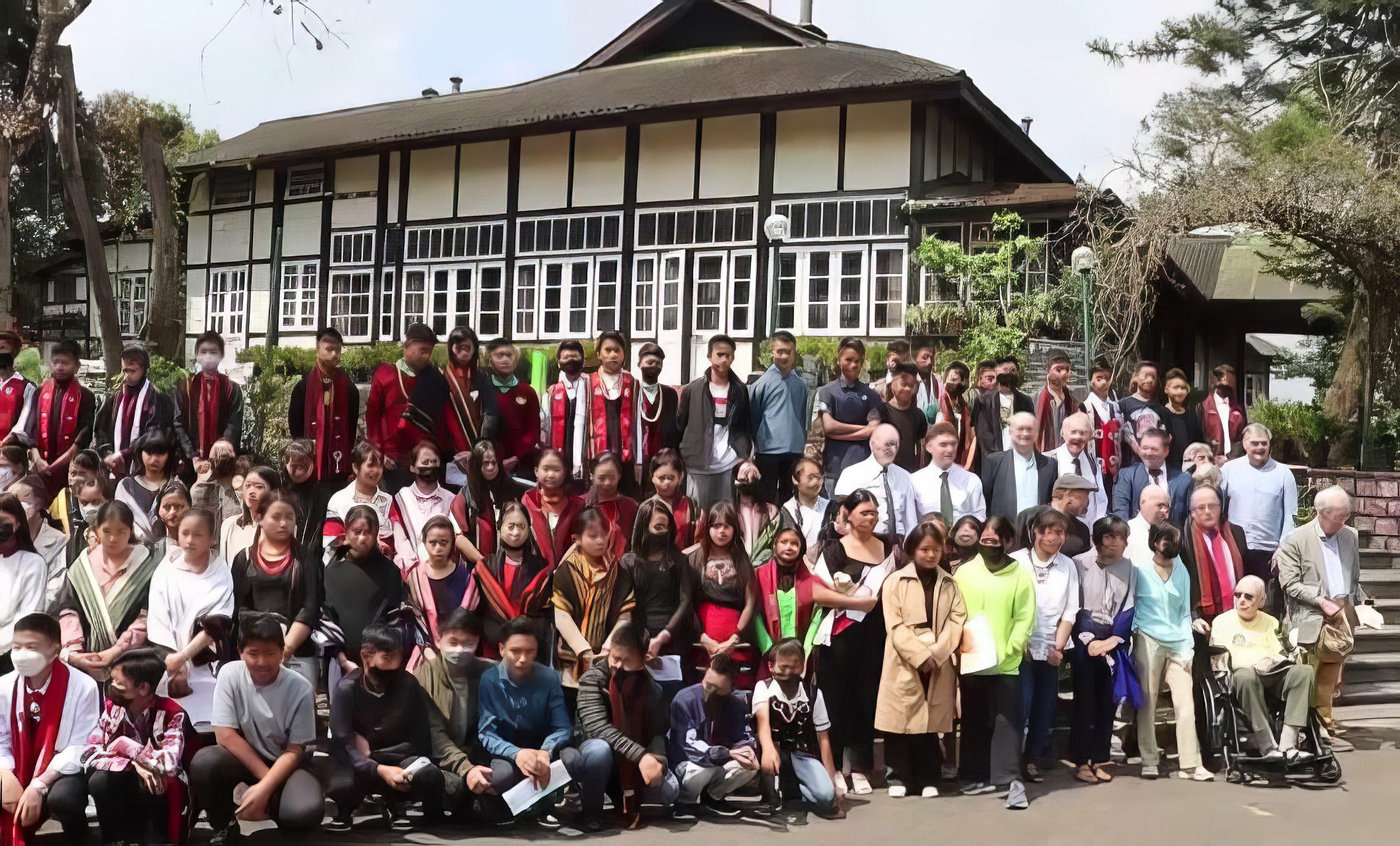
OUR SECRET WW2 SCHOLARSHIP IN INDIA
IN MEMORY OF URSULA GRAHAM BOWER MBE
One of our regular Zoom presentations in 2021 was a film made for the Royal British Legion by our Co-founder Martyn Cox. See https://vimeo.com/457166843
The film’s subject was Ursula Bower and the Naga people who helped her establish a scouting and reconnaissance unit for V Force on the India/Burma border during WW2. While we subsequently and initially thought of funding a commemorative plaque in India, our Secret WW2 Trustee, Treasurer and Projects Officer, Ashley Barnett, came up with a far more meaningful suggestion after hearing of scholarships for the Naga people, granted via the Kohima Educational Trust. After approval from the SECRET WW2 Board of Trustees for a three-year scholarship, Ashley funded his own trip to India on a Kohima and Imphal battlefield tour and now takes up the tale……
“As part of my pre-trip reading, I purchased a copy of ‘Naga Path’ by Ursula Graham Bower MBE, in the hope of gaining an appreciation of the local population.
Like myself, Ursula’s first visit to India came in her twenties, with my visit in 2022 separated by 85 years since Ursula’s in 1937.
As I read ‘Naga Path’, the explorer within me was captivated by her remarkable story. I speculate that like myself, Ursula would not have been satisfied by a beach holiday, but instead yearned to travel to learn more about our vast world.
My visit to Kohima and Imphal was owing to a desire to see and understand the battlefield, I was drawn by military history you could say. For Ursula it was anthropology which warranted her visits. A passionate desire to document the lives of the local Naga tribes.
Following her initial visits to India in 1937 and 1939, Ursula found herself in London for the start of the war, however, she was subsequently able to gain permission to return to the Naga Hills and live among the Naga people in Laisong Village. Here she won the hearts of the local people, who had already won her heart alongside the beauty of the Naga Hills.
With the progress of the Japanese forces through Burma and the serious threat of the invasion of India, Ursula now found herself on the doorstep of destiny.
The British administration asked Ursula to mobilise her local Nagas into a scout unit within V Force, itself a reconnaissance, intelligence-gathering, and guerrilla organisation, very much within the remit of SECRET WW2. A watch-and-warn system was established, filtering the flow of allied movements out of Burma, and aiming to ambush Japanese parties as they advanced.
Her force of over 100 Nagas grew in size and confidence under her leadership, buoyed by supplies of arms and reinforcements, they became known as ‘Bower Force’.
Ursula received the Lawrence Memorial Medal in 1944, named after Lawrence of Arabia and awarded for Ursula’s anthropological work among the Nagas. Ursula was appointed Member of the Order of the British Empire in 1945.
While serving with V Force Ursula encountered Lieutenant Colonel Frederick Nicholson Betts, who she later married in 1945. Their marriage brought two children, Catriona and Alison.
Inspired by Ursula’s story, I was keen to commemorate her in an appropriate manner. This led me to the Kohima Educational Trust (KET) (https://www.kohimaeducationaltrust.net/), which was set up by veterans of the battle in recognition of a debt of honour to the Naga people:
“The trust is seen by its founders both as a means of sustaining the memory of the courage and sacrifice of those who fought and died in the battle, and of honouring the Nagas who were their allies in the war through assisting the education of succeeding generations of Naga children.”
The KET awards hundreds of scholarships on an annual basis to local Naga children, initially supporting their education for a 3-year term, with an option of extending to a 5-year term.
I was grateful to receive the backing of Secret WW2 to award a 3-year scholarship, in recognition of Ursula Graham Bower.
Fortunately, a battlefield tour was timed to coincide with the annual awards ceremony, and having signed up for it I had the honour and privilege of representing Secret WW2 on the day, and directly presenting our scholarship to ‘our’ student. It was an emotional and humbling experience for me.
More on the ceremony can be found here: https://www.kohimaeducationaltrust.net/news-and-events/news/ket-scholarships-awards-ceremony-2022
Following the conclusion of the ceremony I met with ‘our’ student and her father. Both could not thank us enough for our support,
For someone who has benefited from the UK’s state education, it was a humbling experience to see how far £125 (the annual scholarship fee) can really go. We met several students who had completed their scholarship and had moved on to further education and enhanced opportunities.”
Ashley Barnett 2022.
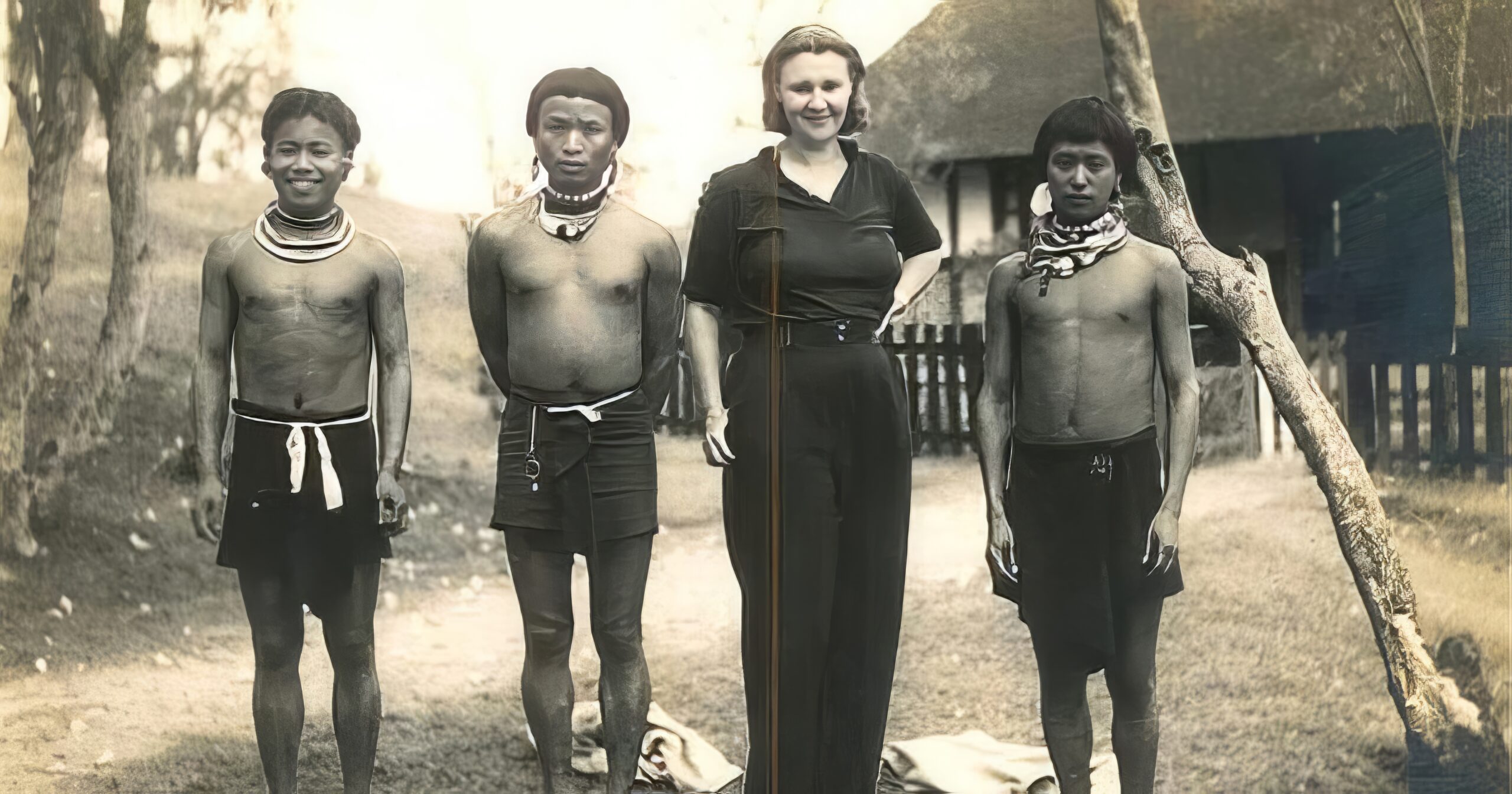
Ursula Bower among the Nagas.
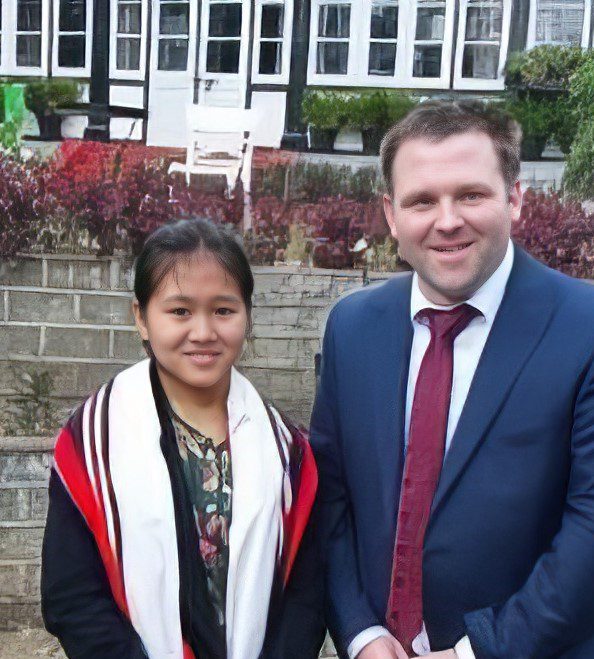
Trustee, Treasurer and Projects Officer Ashley Barnett with our first scholarship recipient in India.
